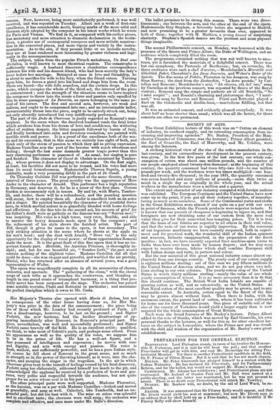Her Majesty's Theatre also opened with Maria di Rakes, but
not in consequence of the other house having done so, for Her Ma- jesty's was prior in the date of the announcement ; the piece being one of those which Mr. Lumley had recently produced at Paris. LIt was a disadvantage, however, to be last on the ground ; and Signor Ferlotti, the new baritone, had the further disadvantage of ap- Paaring, immediately after Ronconi, in Ronconi' s principal part. The piece, nevertheless, was well and successfully performed; and Signor Ferlotti came bravely off the' field. He is an excellent artist; qualified, we think, to take most of Coletti's parts, and perhaps some others. From his appearance as well as the quality of his voice, we suppose him to be in the prime of life. He has a well-set figure, and a face possessed of intelligence and expression ; he moves with ease and dignity, and acts with energy and passion. His voice is fresh, mellow, and sufficiently powerftd; and he has a pure Italian style. Of course he fell short of Ronconi in the great scene, not so much m strength as in the power of throwing himself, as it were, into the cha- racter, and merging the singer in the tragedian. In the air in which Cherreuse gives vent to the tumult of feelings roused by his fatal discovery, Ferlotti sang too elaborately, addressed himself too much to the pit, and acknowledged the applause he received by a profusion of bows and ges- tures, very polite and respectful towards the audience, but not quite proper for an actor whose soul is in his part. The other principal parts were well supported. Madame Fiorentini, as the heroine, was on a par with Madame Castellan—looked and moved as gracefully, and sang as well. Calzolari, like Tamberlik, had an un- grateful part, but did his best with it. The muse en mew was splendid and in excellent taste; the choruses were well sung.; the orchestra was complete and effective, and once more under Mr. Balfe's direction. The ballet promises to be strong this season. There were two diver- tissements; one between the acts, and the other at the end of the opera. Mademoiselle Guy Stephan, a favourite before she migrated to Madrid, and now promising to be a greater favourite than ever, appeared in both of them • together with M. Mathieu, a young dancer of surprising elasticity. Stephan's Spanish dances are the prettiest and most piquant things imaginable.


























 Previous page
Previous page